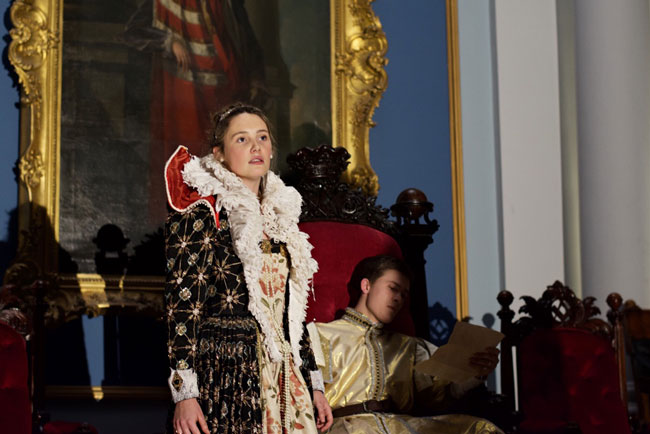
Nestled in Dublin’s Georgian quarter, the Freemason’s Hall was the chosen venue for DU History Society’s drama, The King’s Good Servant. The performance in association with DU Players was presented as a very well-thought-out and rehearsed production, from setting to costumes alike. The event placed Thomas More (1478-1535) and Thomas Cromwell (1485-1540) in competition with one another, both influential men who ended up being publicly executed. The argument was put forward that history has not acknowledged both of these men equally, providing was the source for the initial debate. From Trinity’s history department, Prof Ciaran Brady spoke for the case of More and Dr Graeme Murdock represented Cromwell.
Opening the discussion, Brady dramatically argued that More was a worthier man to remember. He stated he would not try to defend More by describing him as a good Marxist or feminist, but as a good historian. Appealing to the members of DU History, he claimed More to be the “innovator of sixteenth century history”, and that ”history is instilled in Utopia”, More’s famous work.
Brady’s staccato and memorable speech was brought to an overdue end as Murdock rose in defence of Cromwell. The orator began by saying that Cromwell deserves recognition due to his “pragmatic life lived with his constraints” and that his reputation should be salvaged from “appalling” depictions such as A Man for All Seasons, a film widely joked about during the discourse. Cromwell was lauded as the “ultimate self-made man”, but criticised for being essentially Machiavellian in his actions.
The room was then opened up to questions, one of which was directed at Brady, highlighting how More’s “biggest action” was resigning from his post. Brady tackled this question without hesitation, explaining that More recognised the importance of “civic responsibility” and that he could have avoided his fate if he had kept quiet. However, he was a “humanist intellectual” who believed in historical continuity. He held civic philosophy in high regard, and that by resigning he maintained important boundaries.
More and Cromwell’s representation then gave their closing statements, with Brady citing More’s varied work, from the liberal Utopia to the bleak polemics of his later writing. In his final statements, Brady asked his audience to take responsibility for their actions. Murdock boldly stated “to vote against my client is to vote against Shakespeare”, as Cromwell arguably laid the groundwork for the English renaissance at the end of the sixteenth century.
Following the intellectual discourse of the evening came the dramatic production. The performance worked its way through court dealings, religious clashes, tense trials and, decidedly, the final sentences. The proximity of the audience benches to the narrow aisle of the stage strengthened the notion that the spectators acted as the jury. Undoubtedly strong, the play was supported by detailed costumes and lighting that cast impressive shadows over the archaic portraits in the hall. While dignified, the acting allowed for rapturous releases of laughter and sometimes genuine shock.
The evening proved to be thoroughly rewarding and thought provoking for all in attendance. Upon arrival and departure, audience members were asked to vote for the character most worthy of historical glorification. While the first vote was in favour of More, the latter was in favour of Cromwell. Regardless of the shift in votes, the decision to place the greatest power of the evening in the hands of the audience can be viewed as its finest triumph.






